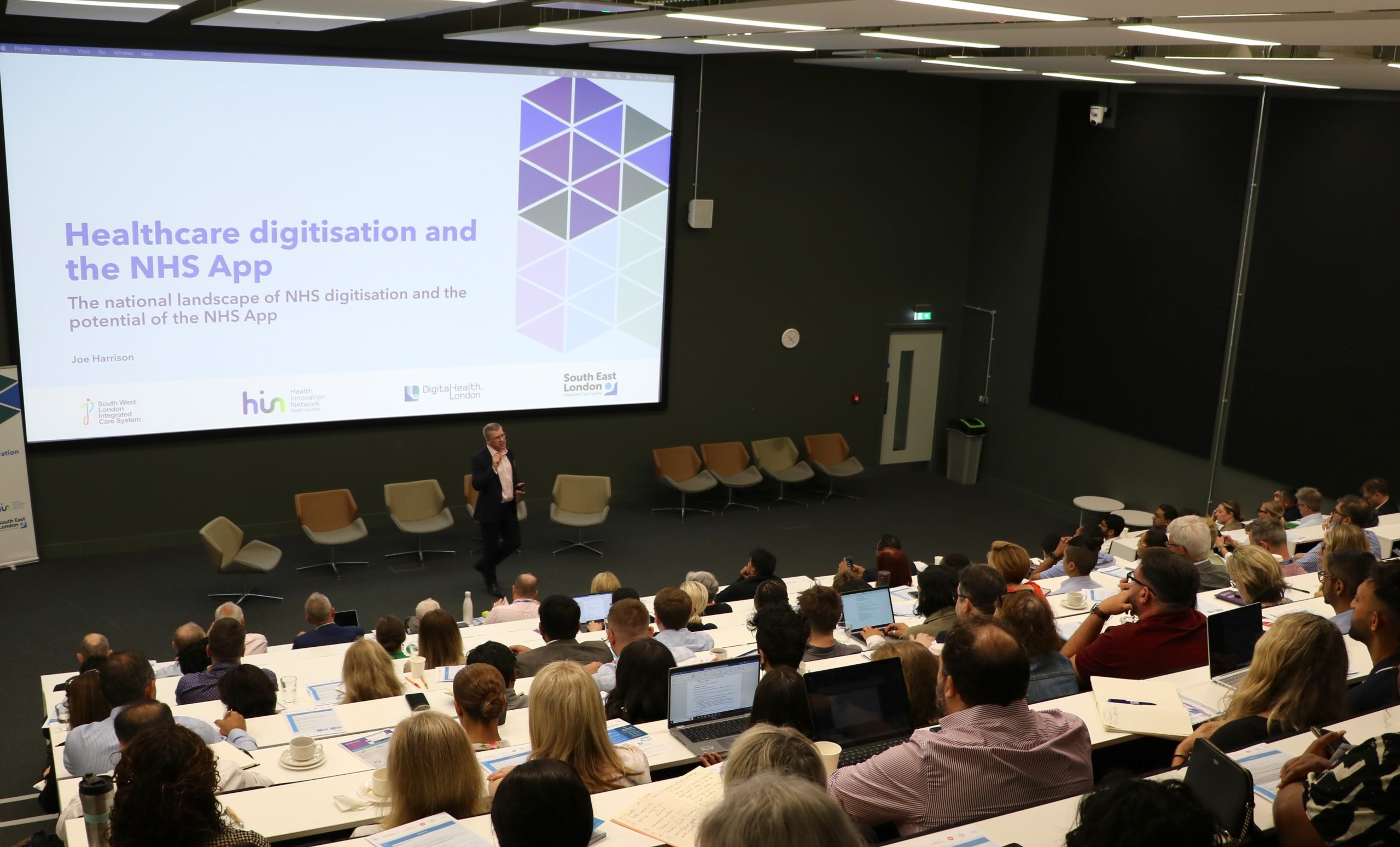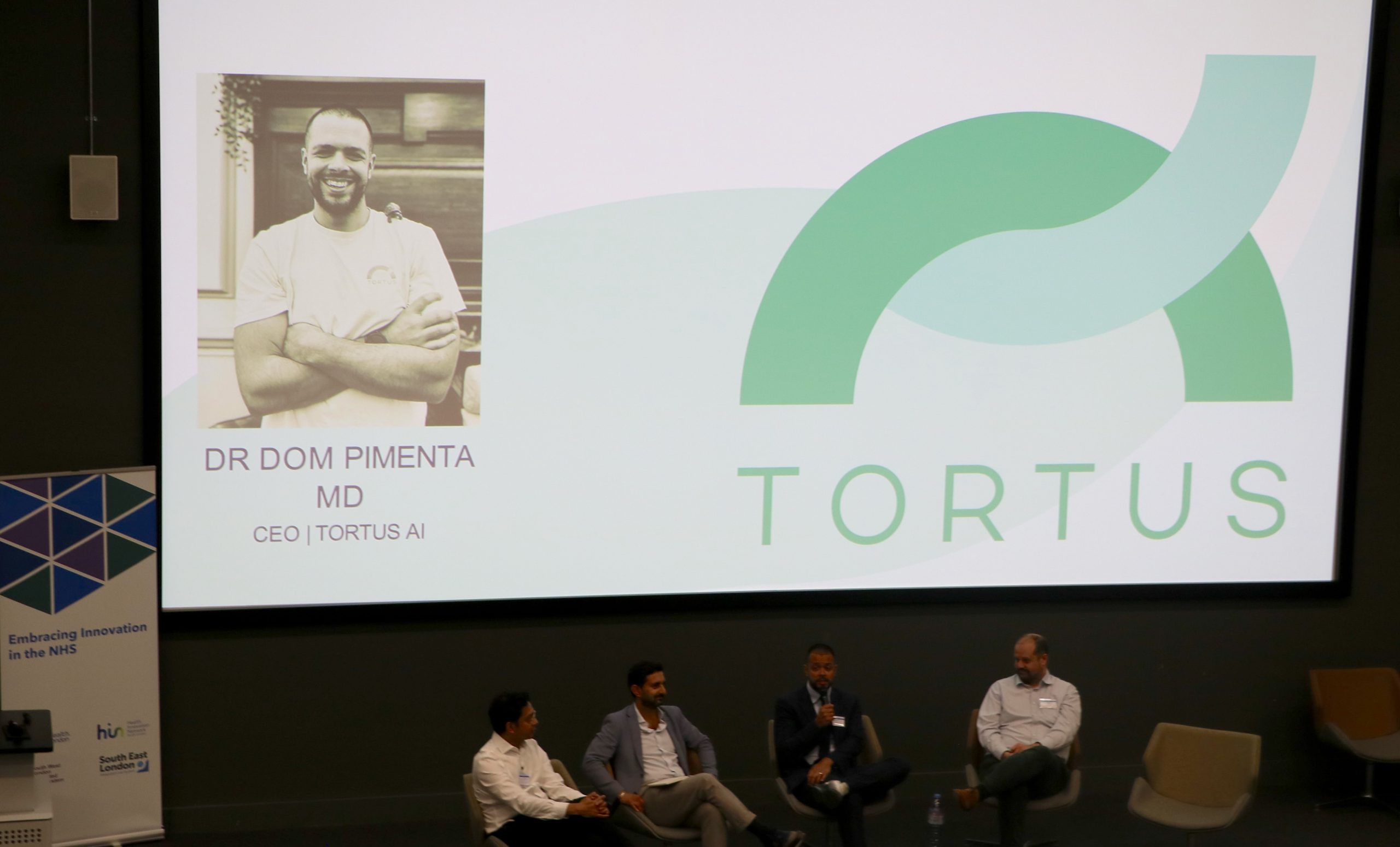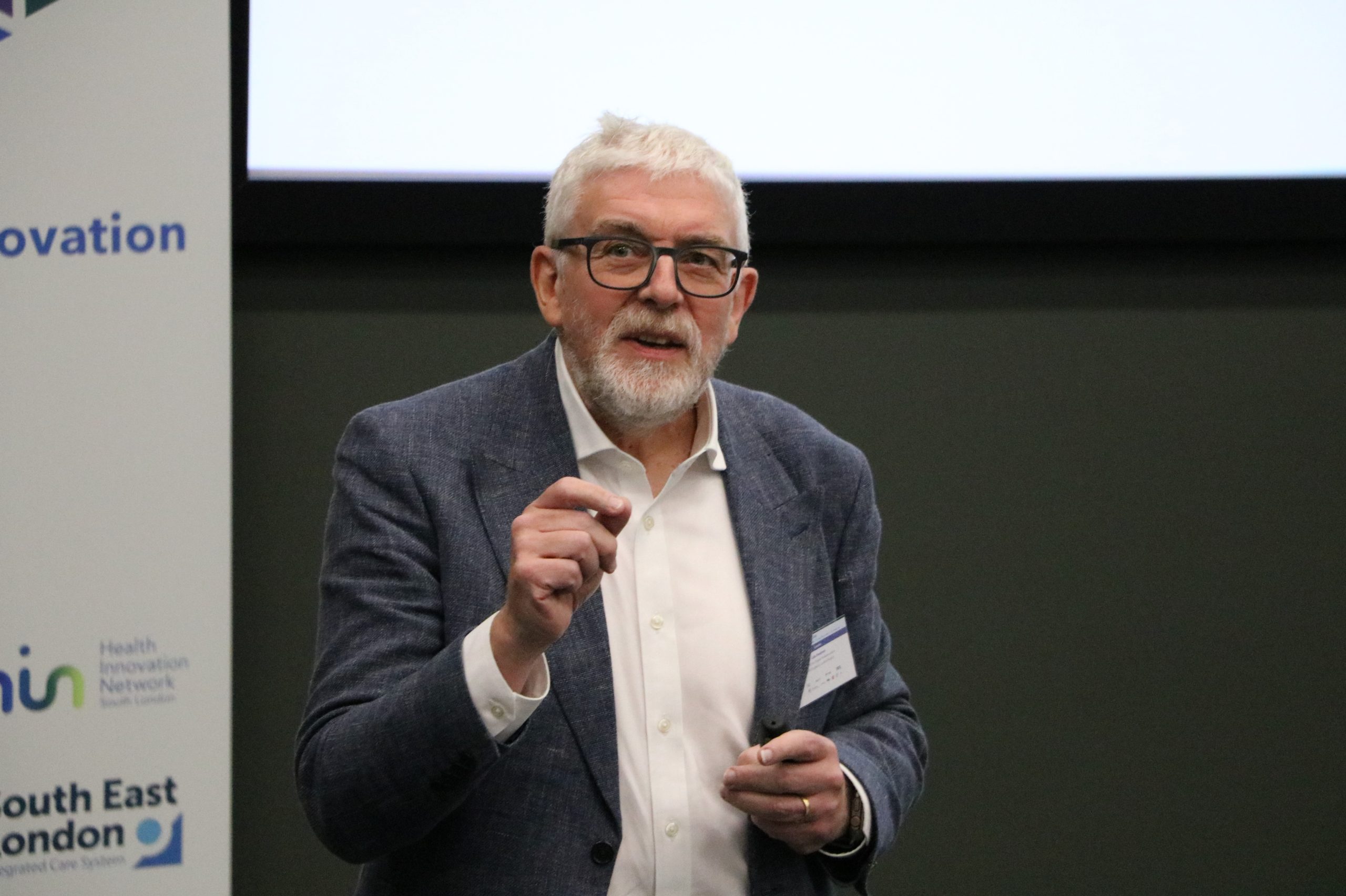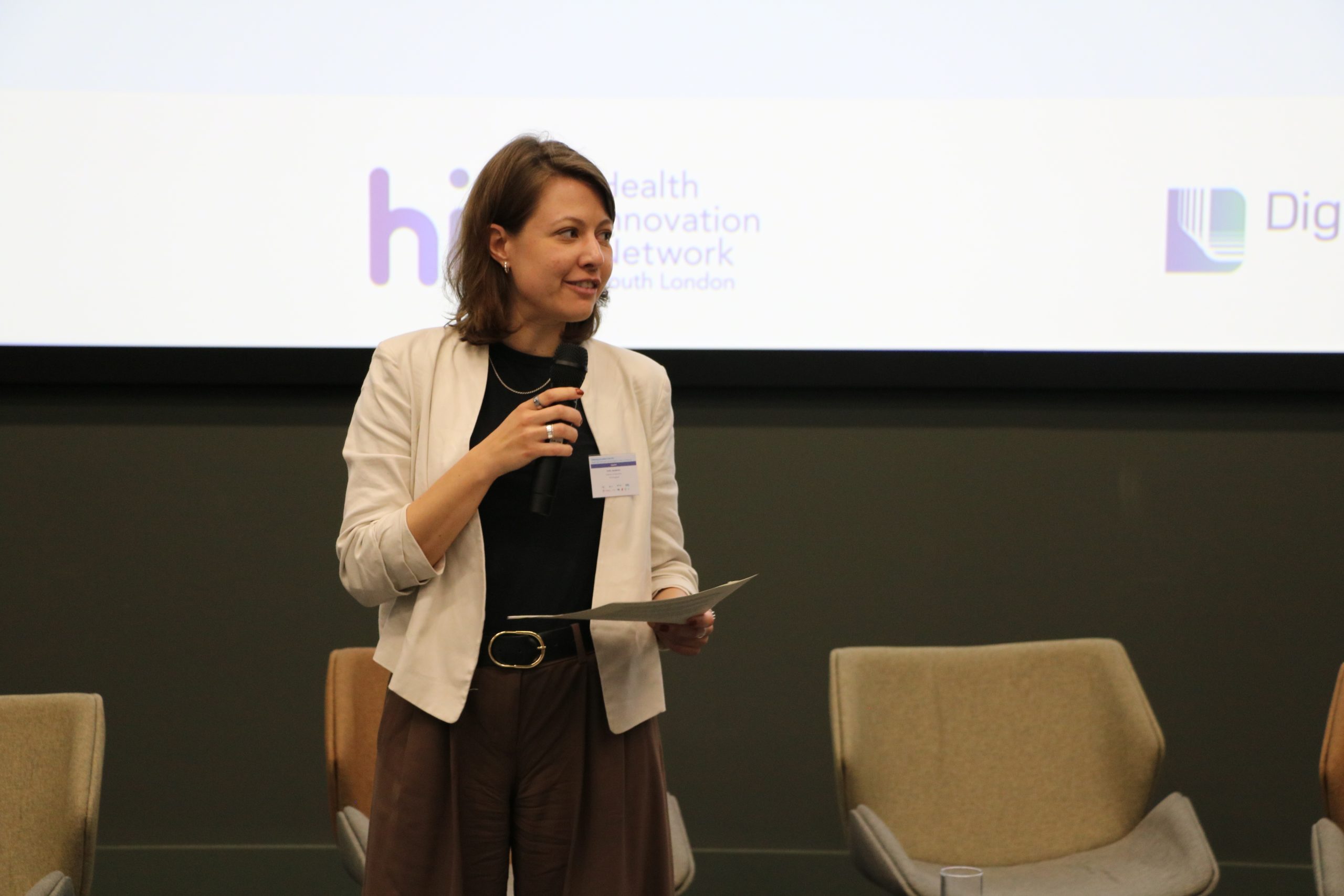Get in touch
If you missed the event and would like to discuss any of the issues raised further, or hear more about the trailblazing work taken place in south London please contact us.
Contact usMore than 200 innovators, entrepreneurs, clinicians and public sector staff came together for the Health Tech and South London Digital Innovation Conference. Brought together by South East London (SEL) ICB, South West London (SWL) ICB and the Health Innovation Network (HIN) South London, and sponsored by Accenture, The Access Group, Bayer, BT Group PLC, Cisco, DAC Beachcroft LLP, First Databank UK Ltd and PA Consulting, it showcased a myriad of innovations aimed at demonstrating how innovation can improve patient care, productivity and prevention. Here Philippa Kirkpatrick, Chief Digital Information Officer at SEL ICB, Martin Ellis, Chief Digital Information Officer at SWL ICB and Anna King, Commercial Director at the HIN delve into three key themes highlighted at the event: improving patient experience, boosting staff experience, and encouraging healthier lifestyles through technology.
NHS challenges are well documented, but the innovation community holds the keys to a healthier, more connected future. The NHS is ready to embrace innovation, and we have a great opportunity to harness the transformative power of technology to improve healthcare delivery, empower patients and develop a health and care system where everyone has the opportunity for a healthy, fulfilling life. The Health Tech and South London Digital Innovation Conference provided a space not just to inspire, but to provide practical information to address the challenges we face.
Funding for health and social care is limited; innovation and technology-enabled transformation are key for helping us to deliver better care to more people using the resources we have available. We are working hard improve the speed at which ideas can move through trial and into commission. So, what can we do now with technology to close that gap, use technology for proactive and anticipatory healthcare and to allow the NHS staff provide better care easily?
At our event we brought together south London, pan-London and national experts to showcase the areas they were working on, and some key themes emerged.
Joe Harrison, Chief Executive, Milton Keynes University Hospital NHS Foundation Trust and National Director, Digital Channels, NHS England gave delegates an inspiring update about the NHS App. The App is a key part of how patients are being enabled to manage their own care, including by letting them easily order repeat prescriptions which saves GPs three minutes each time. Those three minutes make a real difference when four million repeat prescriptions a month are ordered on the App (and that number is going up!).
Joe had been told by people within the system that people did not want the functionality to view medical records on the App, and yet over 18 million people logged in last month to view them. The analogy Joe used was being told by your bank you can't have your balance immediately but they'll send you a letter with the information instead. Ultimately, patient expectations have moved on because of the digital world we all live in, and we need to be reflecting the reality of 2024 rather than 2004.
Using NHS 111 was another example. If people use 111 Online on the NHS App rather than calling 111 it is nine times cheaper for the NHS, four times quicker for the citizen and in turn that frees up time on the telephone for people who cannot use digital. The message was clear – we don’t need to force everyone to go digital for everyone to benefit.

Joe Harrison, Chief Executive, Milton Keynes University Hospital NHS Foundation Trust and National Director, Digital Channels, NHS England

Dominic Pimenta, CEO, Tortus
There was a glimpse into some amazing tech that was already making a difference to staff and patients - Ambient Voice Technology (AVT), a form of Artificial Intelligence (AI).
Audience members were reminded they probably already had a form of voice-enabled AI in their homes – whether Alexa, Google Home or another device. Consumer technology is of course easier to implement, but it shouldn’t come as a huge surprise that AI-enabled technology such as AVT is actually starting to be used out in the “real world” of health and care.
What AVT does is listens in to doctor/patient conversations (with patient permission) and then produces a near real-time note for the patient record which is checked by the clinician before saving. After checking that the notes are correct, the technology can also interact with clinical systems to automate some routine tasks such as ordering blood tests.
Delegates at the event heard from GPs, project managers and innovators about early experiences with AVT in real services. Dominic Pimenta of TORTUS described their ambition of a “triple win” of patients having more time with doctors, doctors having less time focused on inputting data, and systems receiving more consistent data.
Although the technology is still rapidly evolving, there seems to be growing evidence that AVT is starting to deliver against these goals. Savings of a few minutes per consultation over a week might end up meaning two hours of family time reinstated at a weekend; unsurprisingly, patients appear to value doctors who can give them their full attention rather than turning away to a computer screen at a crucial moment.
Such is the excitement around the possibility of this technology, which the HIN held an innovation exchange on last year, bringing together industry partners, clinicians and patients to understand the "art of the possible" and articulate the hopes and challenges around AVT.
Discussions throughout the day highlighted the role innovation and technology could play by focusing more on prevention and keeping people well.
Chris Streather, Regional Medical Director & Chief Clinical Information Officer at NHS England (London) admitted that the focus had traditionally been on hospital care - his view was that health services had to shift upstream into prevention and better management of people with long-term conditions, so people don't get sick, get less sick and be cared for closer to their homes. Embracing digital innovation is crucial for the management of at-risk people and will reduce the likelihood of hospital admissions. Remote monitoring offers patients the opportunity to have real-time access to medical advice and allows healthcare providers to detect signs and symptoms early, adjust treatments promptly, and offer personalised care plans.
For innovation of this scale to take place, patient data will have to be accessible in different parts of the NHS. In his presentation on joining up data, Luke Readman, Regional Director of Digital Transformation, NHS England (London) informed delegates that 20-30% of the care people receive is in a different ICS to the one in which they reside – meaning that our NHS geography is artificial to most people's lives. For him adoption at scale was hard but important and he reiterated that the technology can be put in place, but in order to make a difference, systems need to collaborate to scale personalised and effective care.

Luke Readman, Regional Director of Digital Transformation, NHS England (London)

Emily Henderson, Director of Innovation at NHS England
The day finished with delegates hearing from Emily Henderson, Director of Innovation at NHS England. She was clear that she wants to create the environment in which new innovation can be built and scaled within the NHS. The event had helped her understand the incredible work that is already happening, and what needs to change. Her view was that Health Innovation Networks were critical to supporting innovation to be adopted, helping to understand how national aims related to local needs.
We felt the event showcased the great work in south London and that as we continue to innovate and integrate technologies into our healthcare systems, we move closer to a future where healthcare is more efficient, effective, and accessible for all. By embracing these innovations, we can improve the quality of care, enhance the well-being of healthcare professionals, and empower individuals to lead healthier lives.
If you missed the event and would like to discuss any of the issues raised further, or hear more about the trailblazing work taken place in south London please contact us.
Contact us